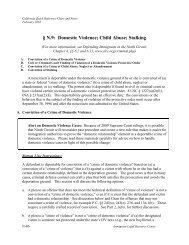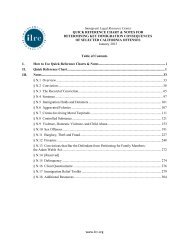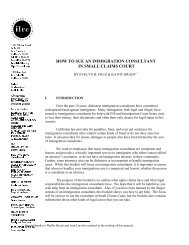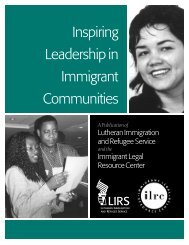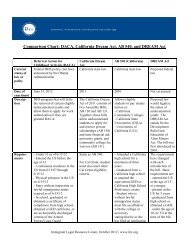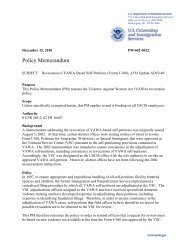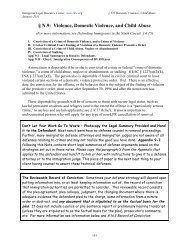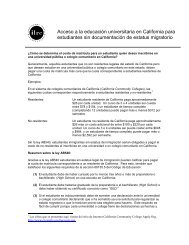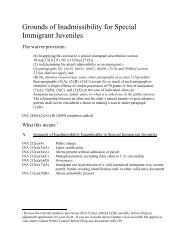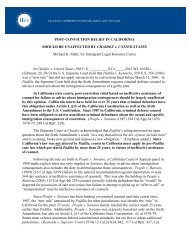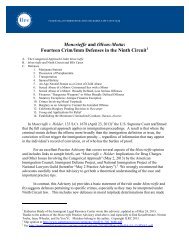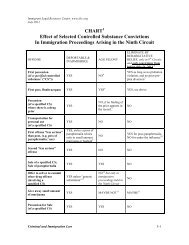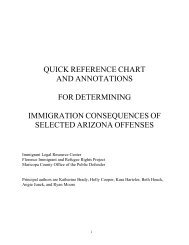Chart C: Derivative Citizenship - ILRC
Chart C: Derivative Citizenship - ILRC
Chart C: Derivative Citizenship - ILRC
You also want an ePaper? Increase the reach of your titles
YUMPU automatically turns print PDFs into web optimized ePapers that Google loves.
21 See endnote 11 above. In Martinez-Madera v. Holder, 559 F.3d 937 (9th Cir. 2009), the Ninth Circuit held that an individual could not derive U.S. citizenship<br />
from his stepfather by virtue of the state’s legitimation statute.<br />
22 See 7 FAM 1153.4-4 (Foreign Affairs Manual) for a general description of the law.<br />
23 See endnote 7 above.<br />
24 See endnote 8 above.<br />
25 See endnote 10 above.<br />
26 See endnote 18 above.<br />
27 See endnote 19 above. See also Matter of Nwozuzu, 24 I&N Dec. 609 (BIA 2008).<br />
28 See endnote 20 above.<br />
29 Adopted children must be residing in the U.S. pursuant to a lawful admission for permanent residence at the time of the adoptive parent(s)' naturalization. See<br />
Passport Bulletin 96-18. Thus, in derivation cases for adopted children, the sequence of events can be important. This is different than the practice in derivation<br />
cases for biological children. See endnote 11.<br />
30 Between 10/5/78 and 12/29/81, adopted children could only derive citizenship if adoption occurred before the child turned 16. [See INS Interp. 320.1 (d)(2)].<br />
31 See Matter of Guzman-Gomez, 24 I&N Dec. 824 (BIA 2009) (holding that a child born outside the United States cannot obtain derivative citizenship by virtue<br />
of his or her relationship to a nonadoptive stepparent).<br />
32 People born between 2/27/83 and 2/26/01 may derive citizenship by satisfying the requirements of either this row or the “10/5/78 to 2/26/01” row. Note that<br />
the law is not retroactive, so individuals who are 18 years or older on February 27, 2001 do not qualify for citizenship under this law.<br />
33 INA section 320 as amended by the Child <strong>Citizenship</strong> Act of 2000.<br />
34 Please see U.S. Department of Homeland Security, Bureau of <strong>Citizenship</strong> and Immigration Services Memo Number HQ 70/34.2-P, dated September 26, 2003<br />
and titled Eligibility of Children Born out of Wedlock for <strong>Derivative</strong> <strong>Citizenship</strong>. Although the <strong>ILRC</strong> believes this <strong>Citizenship</strong> and Immigration Service memo<br />
should apply to mothers who naturalized or who became U.S. citizens by birth in the U.S., derivation, or acquisition of citizenship, the CIS may successfully<br />
argue that it only applies to naturalized mothers because the memo specifically states “Assuming an alien child meets all other requirements of Section 320 and<br />
322, an alien child who was born out of wedlock and has not been legitimated is eligible for derivative citizenship when the mother of such a child becomes a<br />
naturalized citizen.”<br />
35 The text of INA section 320 as amended by the Child <strong>Citizenship</strong> Act of 2000 does not mention illegitimacy, but INA section 101(c)(1) excludes illegitimate<br />
children from the definition of “child,” unless legitimated by the father under either the law of the child’s domicile or the law of the father’s domicile. The<br />
legitimation requirement will be a hurdle for some people for two reasons. First, the legitimation must take place before the child turns 16. Once s/he turns 16, it<br />
is too late for the legitimation to count for § 320 citizenship purposes. Please note that neither INA §320 nor 8 CFR § 320.1 state the legitimation must occur<br />
before the 16 th birthday. Thus, some argue that such a legitimation could take place even between the 16 th and 18 th birthdays. This argument appears weak<br />
because of the definition of child found in INA §101(c), which applies to the citizenship and naturalization contexts. Second, many people do not think about or<br />
know about the legitimation process. It is important to note that according to the U.S. Department of Homeland Security, Bureau of <strong>Citizenship</strong> and Immigration<br />
Services Memo Number HQ 70/34.2-P, dated September 26, 2003 and titled Eligibility of Children Born out of Wedlock for <strong>Derivative</strong> <strong>Citizenship</strong>, only<br />
naturalized mothers can confer citizenship upon their unlegitimated children born of wedlock under INA § 320. <strong>ILRC</strong> assumes that mothers who are U.S.<br />
citizens by other means such as birth in the U.S. also can confer citizenship under INA §320 to such children.<br />
36 INA section 320 as amended by the Child <strong>Citizenship</strong> Act of 2000.<br />
37 INA section 320 as amended by the Child <strong>Citizenship</strong> Act of 2000.<br />
38 INA section 320 as amended by the Child <strong>Citizenship</strong> Act of 2000. In Walker v. Holder, 2009 WL 4725237 (1st Cir. 2009), the First Circuit held that an<br />
individual has not satisfied the requirement for “lawful admission for permanent residence” if that person obtained a green card through fraud or<br />
misrepresentation, even if the individual was a child when he first entered the United States with no control over the actions of his guardians.<br />
39 INA section 320 as amended by the Child <strong>Citizenship</strong> Act of 2000. It is the <strong>ILRC</strong>’s interpretation that for purposes of the Child <strong>Citizenship</strong> Act of 2000, the<br />
CIS will presume that a child who was born out of wedlock and has not been legitimated and whose mother has naturalized or is a U.S. citizen through any other<br />
means (i.e., birth in U.S, acquisition or derivation) would be considered to be in the legal custody of the mother for section 320 citizenship. See U.S. Department<br />
of Homeland Security, Bureau of <strong>Citizenship</strong> and Immigration Services Memo Number HQ 70/34.2-P, dated September 26, 2003 and titled, Eligibility of<br />
Children Born out of Wedlock for <strong>Derivative</strong> <strong>Citizenship</strong>. Additionally, 8 CFR § 320.1 sets forth several different scenarios in which the CIS presumes, absent<br />
evidence to the contrary, that the parent has the necessary legal custody to apply for § 320 citizenship for his/her child. First, the CIS will presume, absent<br />
evidence to the contrary, that both parents have legal custody for purposes of § 320 citizenship where their biological child currently resides with them and the



